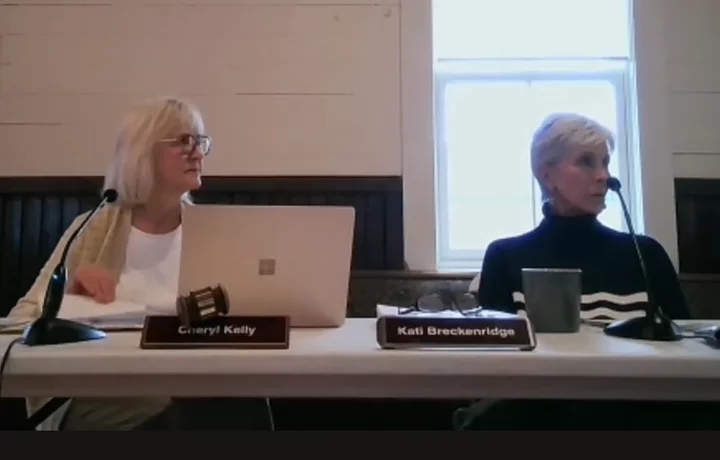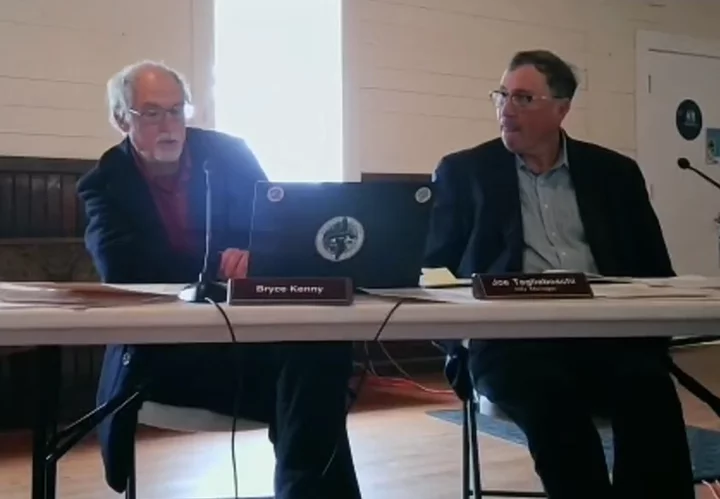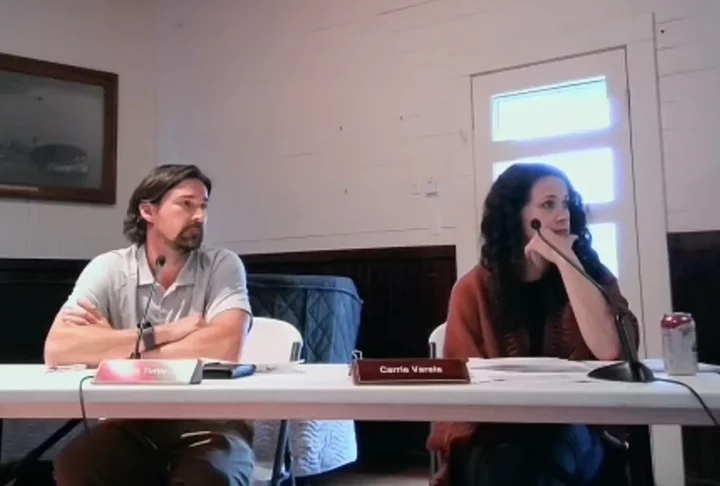Trinidad Mayor Cheryl Kelly and Councilmember Kati Breckenridge.
###
PREVIOUSLY
###
After sourcing its water from the Luffenholtz Creek watershed for the past 50 years, the City of Trinidad is ready to explore another possibility.
With a 3-2 vote on Tuesday night, the Trinidad City Council directed staff to pursue a study analyzing the pros and cons of switching its supply from Luffenholtz to the Humboldt Bay Municipal Water District (HBMWD), which delivers water from Ruth Lake and the Mad River to more than 88,000 customers in Eureka, Arcata, McKinleyville, Blue Lake, Manila and other local communities.
This prospect, which the city has discussed for more than six years, has long been controversial in this picturesque seaside community, where many residents worry that hooking into a mainline extension from HBMWD would open the floodgates to rapid population growth, potentially ruining the community’s quaint character.
However, the city’s largest water customer, the Trinidad Rancheria, is independently pursuing its own connection to HBMWD, in part so that it can proceed with plans to build a five-story, 100-room Hyatt hotel overlooking Trinidad Harbor. The Rancheria’s departure would increase costs for Trinidad’s remaining ratepayers.
Meanwhile, the city’s water department has other issues, including staffing difficulties, regulatory challenges tied to aging infrastructure and capacity concerns, particularly during drought conditions. During the dry years of 2018-2021, for example, Trinidad implemented emergency conservation measures amid a series of water shortages, which were exacerbated by leaks in the city’s aging infrastructure.
Trinidad Mayor Pro-Tem Bryce Kenny and City Manager Joe Tagliaboschi. | Screenshot.
###
On Tuesday evening, Trinidad City Manager Joe Tagliaboschi said that HBMWD, by contrast, is “known for a high-capacity, reliable source, very good regulatory compliance, and they have economy of scale based on their size that we do not enjoy.”
The Rancheria has invited Trinidad to participate in its own engineering study, and Tagliaboschi said he’s confident that the city could get grant funding to cover the cost, which could be upwards of $200,000.
Public speakers at Tuesday night’s meeting were divided on the topic, with some residents saying the council should pursue a study so that it can make a more informed decision while others voiced strong opposition to pursuing a new water supply.
“More water means more growth, and more growth means a massive change to this unique and beautiful town,” warned one man. (If he identified himself, the microphone didn’t catch it.) “Ten years after that water line comes in, if it does, you won’t recognize this area anymore,” he continued. “You sure as hell won’t recognize Trinidad.”
Other critics expressed concerns about impacts to the environment, saying pipeline construction could cause harm while population growth could lead to increased pollution of groundwater and beaches.
However, another Trinidad water customer said, “Beyond water scarcity, water quality and fire safety issues, it’s now clear that the City of Trinidad can no longer afford to operate its municipal water plant.” She noted that for the past three years, the city has been forced to hire expensive state-licensed consultants to operate the plant. “Please move forward with the feasibility study and ultimately connect to Humboldt water district so that Trinidad can be a water-resilient city,” she concluded.
“I’m in favor of a study,” the following public speaker said. “It just asks you to get information. I don’t know why there’s so much opposition to gaining facts.” He said the community should be worried more about shrinking than growing. “You are making generational decisions right now that will impact the viability with this community, the City of Trinidad, going forward. We are shrinking. We are struggling to fill seats on our council, our planning commission. We gotta be responsible, get data and make responsible decisions.”
Trinidad Rancheria Chief Executive Officer Jacque Hostler-Carmesin said the tribe is definitely moving forward with the pipeline, and an alternatives analysis commissioned by the Rancheria will soon be a public document. “So we’re here to partner if you want to partner,” Hostler-Carmesin. “I think [HBMWD] is the one that’s going to want a decision from the city, but the Rancheria is moving forward very rapidly. We intend to move this into construction within the next two years.”
But Steve Madrone, Humboldt County’s Fifth District Supervisor, said the city should focus on improving the resiliency of its existing system, in part by pursuing distributed storage. He said Luffenholtz Creek has never gone fully dry in its recorded history, and he suggested that a mainline extension from HBMWD could be damaged in an earthquake.
While rates might be cheaper through HBMWD, Madrone said, “It will change the face of this community if you end up deciding to hook into this pipeline or support it in any way.”
When the matter came back to the council for deliberation, Mayor Cheryl Kelly said she was leaning toward pursuing the study so that the council could make a more informed decision.
Mayor Pro-Tem Bryce Kenny, on the other hand, delivered a PowerPoint presentation under a header saying the pipeline “is not a good thing for Trinidad.” Like Madrone, Kenny argued that Luffenholtz Creek has plenty of water to meet the city’s current needs, and he advocated for working to preserve “the special character of this area.”
Trinidad Councilmembers Jack Tuttle and Carrie Varela.
###
Councilmembers Jack Tuttle and Carrie Varela both said they were torn over which way to vote.
“There’s a lot of good points on both sides,” Tuttle said. Varela said the water supply issue is connected to other important municipal concerns, including annexation into the HBMWD’s service area and impacts to the city’s sewer system. But she said she leaned toward doing a feasibility study that compares a variety of options, not just the pipeline.
Councilmember Kati Breckenridge also said she was in favor of a feasibility study.
Mayor Kelly wound up making a motion to direct staff to proceed with an analysis comparing the city’s two primary options:
- staying with the existing system or
- connecting to HBMWD’s supply via a pipeline extension, “maybe down the road, in 20 years, I don’t know,” she said.
Members of the public in attendance interjected as Kelly moved toward calling for a vote. She finally asked for a show of hands. The video of the meeting shows Kelly and Breckenridge raising their hands in support, and Kenny could be heard offscreen voting against the measure. It’s unclear whether Tuttle or Varela cast the third and deciding “yes” vote, but the motion passed.



CLICK TO MANAGE